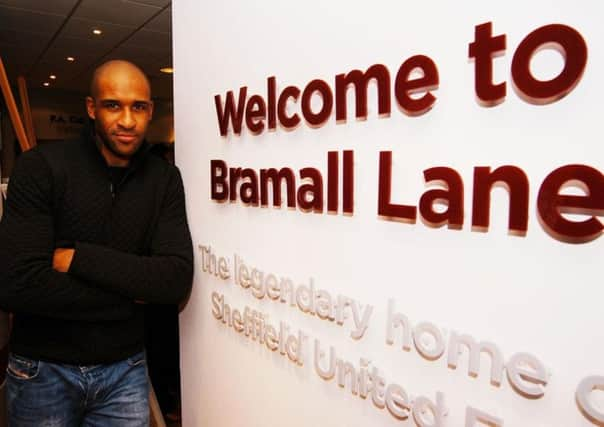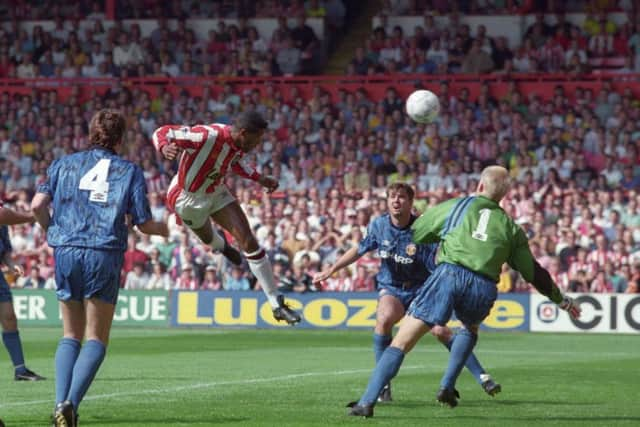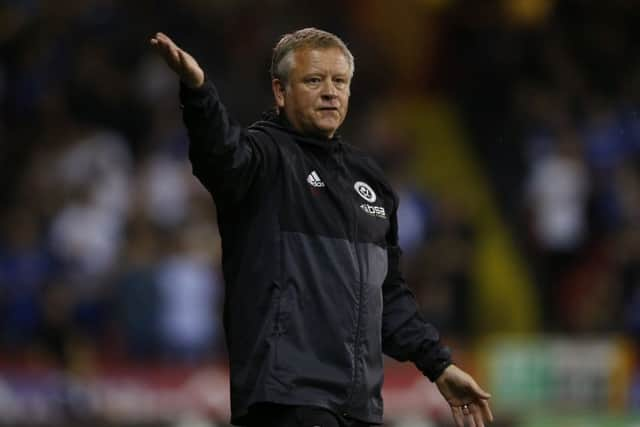Too much, too young: Why Brian Dean thinks today's youngsters have it too easy


Listen to the former Blades, Leeds United and Middlesbrough forward and you will quickly ascertain that it has not entirely been for the better, in his view. Quite the opposite, in fact.
Deane, forever remembered for scoring the first Premier League goal in the Blades’ 2-1 victory over Manchester United at a sun-drenched Bramall Lane on August 15, 1992, earned his stripes at a time when old-school values still carried considerable merit at the top level of the game.
Advertisement
Hide AdAdvertisement
Hide AdIt was a time when young players had to graft to earn their rewards, more especially if you started out in the muck-and-nettles of lower-league football, which Deane famously did at Doncaster Rovers after being rejected as a youngster by home-town club Leeds United.
Those who started out as apprentices at established top-flight clubs also soon learned the values of taking responsibility, fending for yourself and paying your dues.
Nothing was a given. That was in stark contrast to now, in the view of Deane, who moved to the Blades for a bargain £30,000 from Doncaster in July, 1988.
The sight of young players being given far too much, too young and being paid eye-watering amounts of money long before making the Premier League grade is something that disturbs Deane, both morally and professionally.
Advertisement
Hide AdAdvertisement
Hide AdThe cash-rich Premier League has become a financial monster. It may be a huge global industry, but some unfortunate consequences are young footballers who are often primarily motivated by money as opposed to career progression – with a growing sense of dislocation between young player and senior first-teamer.


Deane told The Yorkshire Post: “A lot of the time, modern football is quite sterile. The infrastructure changes have been good. But, on the other hand, money has ruined certain aspects of the game. You have got young players who are not hungry any more.
“I am not one to browbeat kids in terms of what they can get. But when you put kids on massive money and they have no understanding of its worth, then you make them lose their edge.
“They are not hungry any more. It is not just a case of me harping back to the good old days, it is just a case of remembering what it takes to get you to the top.
Advertisement
Hide AdAdvertisement
Hide Ad“Some of the players in South America come out of the ghettos and it is the same in areas of France. Are we losing that?


“What you don’t realise about the players that we had in my days is that there was some real talent. Look at someone like John Barnes, for example. If he’d had all of the new training techniques and nutrition and all that, what would he have been worth now?
“It was an era of exceptional players and a lot of players now are just thrust into it on reputation. Now you almost build up players as legends by their brands off the pitch. I am not just bellyaching, but now I just despair at what I see.”
Twenty-five years on, the top-level managerial landscape is also wholly different from when domestic names such as Alex Ferguson, George Graham and Ron Atkinson ruled the roost.
Advertisement
Hide AdAdvertisement
Hide AdBack then, in terms of style and ethos, managers were pretty much cut from similar cloth, with man-management skills being every bit as important as technical prowess and ownership of countless coaching badges and attending every coaching seminar under the sun.


Foreign ‘new age’ coaches are now in vogue. Just as young players had to do when he was making his way in the game, Deane now appreciates how tough it is for home-grown managers to reach the top.
Thankfully, there are kernels of hope if you delve deep enough, with some individuals successfully showing that there is still a place for old-school values alongside the new.
Prominent among that number is Chris Wilder, in charge of Deane’s former club Blades, with the 49-year-old coming up the hard way in a managerial sense after character-defining spells at the likes of FC Halifax Town, Oxford United and Northampton Town.
Advertisement
Hide AdAdvertisement
Hide AdDeane has been impressed, while being mindful that natural managerial ‘fits’ with a club are a bit of a rarity these days.
He said: “Chris is a manager who seems to know what he wants. If you can understand and deal with those (Sheffield United) fans, who are very loyal, you have a chance. If you try and give them something that they don’t want, then they won’t have you at all!
“Management is a different game now. You have a lot of foreign coaches, which is not a bad thing and it can be good.


“But what has happened is we have perhaps changed too much ourselves and gone away from what we are good at. It is now about what you read in a book and the psychology of sport.
Advertisement
Hide AdAdvertisement
Hide Ad“Don’t get me wrong, some of the experiences I had as a player with managers and having them really shout at you at half-time wasn’t a pleasant experience. That’s bad man-management. But I do feel like we are missing something.”
Brian Deane was speaking on behalf of Play With A Legend, an events company and agency for former footballers, which gives fans the chance to play alongside over 100 of them. Visit Play With A Legend for more information.